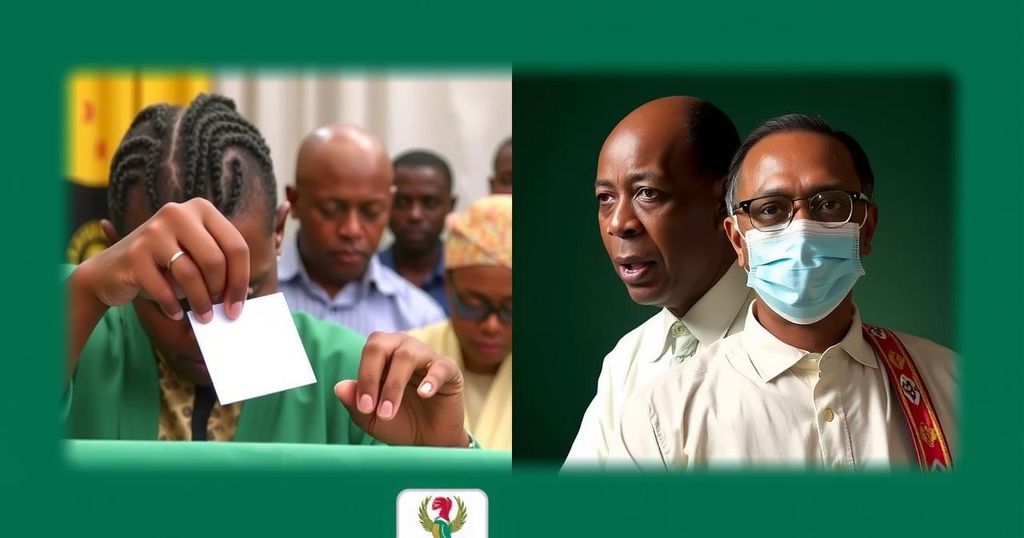Ghana’s Electoral Success vs. Nigeria’s Challenges: A Call for Reform
Ghana successfully conducted its presidential elections with John Dramani Mahama emerging victorious, contrasting sharply with Nigeria’s 2023 elections plagued by irregularities and technology failures. The election’s transparency and efficiency highlighted Ghana’s strong electoral framework, raising questions about Nigeria’s expenditure, planning, and public trust in electoral institutions.
John Dramani Mahama, the former president of Ghana, triumphed in the recent presidential election held over the weekend, following Vice President Mahamudu Bawumia’s concession of defeat. Bawumia acknowledged the will of the populace, stating, “The people of Ghana have spoken, the people have voted for change at this time and we respect it with all humility.” This successful election underscores Ghana’s position as a leading example of democracy in Africa, receiving praise for both its transparency and efficiency from observers globally.
Mahmood Yakubu, Chairman of Nigeria’s Independent National Electoral Commission (INEC), who observed the election, expressed gratitude for its commendable execution. In stark contrast, Nigeria’s 2023 elections were marred by numerous irregularities and technological failures, costing the nation an exorbitant amount that raised questions regarding resource management and the conduct of the electoral officials.
Ghana’s Electoral Commission (EC) stood out due to its meticulous planning and resource allocation, ensuring that essential areas like logistics and voter education were prioritized. Meanwhile, INEC struggled with operational challenges despite its significant budget, as critical technologies designed to promote transparency experienced failures at pivotal moments.
Additionally, Ghana displayed fiscal discipline in maintaining a modest election budget, while critics of Nigeria’s electoral process pointed out issues of inefficiency, corruption, and questionable expenditures leading to public distrust. The credibility of Ghana’s EC stemmed from years of transparent dealings, fostering public confidence which further calmed pre-election tensions. Conversely, INEC’s credit is diminished by accusations of bias and incompetence, prompting voter apathy.
Moreover, Ghana’s electoral process is simplified and efficient, in contrast to Nigeria’s complex system involving multiple simultaneous contests which often overwhelms election officials, resulting in operational failures. Consequently, Ghana’s achievements in credible elections emphasize the need for effective planning, financial accountability, and public trust in establishing a flourishing democratic process.
For Nigeria to enhance its electoral integrity, it must address significant systemic flaws and prioritize the sovereignty of its democratic institutions. Without substantial reforms, public trust in Nigeria’s electoral processes may continue to diminish, highlighting the gap between the efficiency of smaller nations like Ghana and the challenges faced by larger democracies.
The article discusses the stark differences between the recent presidential election in Ghana, which was executed flawlessly, and Nigeria’s previous elections, which suffered from irregularities and inefficiency. It emphasizes the need for improved electoral processes, transparency, and public trust in democratic institutions to enhance Nigeria’s electoral credibility. The success of Ghana’s electoral system serves as a model for Nigeria to learn from in its pursuit of better election outcomes.
In conclusion, Ghana’s recent electoral success highlights critical lessons in electoral integrity that Nigeria must consider. Emphasizing efficient planning, fiscal responsibility, and building public trust are vital for revamping Nigeria’s democratic processes. Without significant reforms, Nigeria risks further erosion of public confidence, continuing to lag behind in achieving credible elections despite its status as Africa’s most populous country.
Original Source: businessday.ng




Post Comment